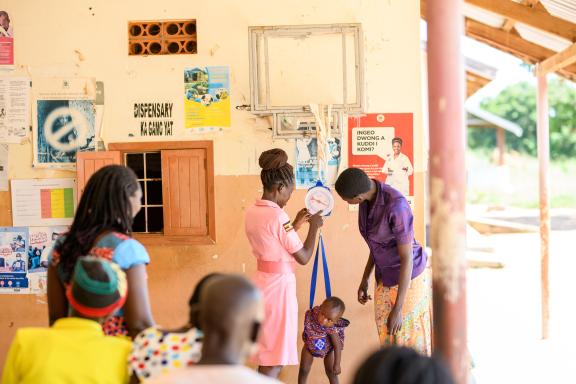
Growth monitoring and promotion (GMP) is considered a critical service for identifying and addressing growth problems and preventing children from progressing into malnutrition. Many low- and middle-income countries implement GMP; however, GMP has demonstrated varied results. Several countries encounter challenges in measuring, recording, plotting, and interpreting indicators of nutritional status and growth. Challenges also exist within the promotion component. Often, counseling during GMP does not take place, or is too generic. Health workers fail to tailor suggested actions to the child’s specific characteristics that may be causing the growth problem or, the suggestions provided are not feasible for the caregiver.
Digital tools have the ability to improve quality of care by increasing health workers' adherence to protocols and guidelines.
Recognizing the potential of digital tools to improve the quality of GMP services, USAID Advancing Nutrition developed a Guidance Package for Developing Digital Tracking and Decision Support Tools for Growth Monitoring and Promotion Services to facilitate the development of country-specific digital tracking and decision-support (DTDS) tools for the delivery and supervision of GMP services. Using standardized guidance for DTDS development can save time and resources, reduce duplication of efforts, errors, and inconsistencies, and ensure adherence to global guidance. The guidance package compiles the most relevant resources on the delivery of GMP services and guidelines for developing and implementing such tools for health and/or nutrition program managers who oversee GMP services, digital or health information system counterparts, and software development teams.
Speakers presented on how the guidance package has been used so far, ways in which similar guidance packages (digital adaptation kits) have been used by the World Health Organization (WHO), and experiences with similar digital tools in Burkina Faso, Ethiopia, Ghana, India, Malawi, Nepal, Zambia, and Zimbabwe. This webinar was available in English, Spanish, and French.
Webinar Recordings
View webinar transcript (PDF, 341.77 KB)
Voir la transcription (PDF, 334.37 KB)
Ver transcripción (PDF, 317.84 KB)
Speakers:
- Sascha Lamstein, Senior Nutrition Technical Advisor, USAID Advancing Nutrition
- Christina Villella, Digital Health Technical Advisor, USAID Advancing Nutrition
- Elaine Gray, Nutrition Advisor, Nutrition and Environmental Health Division, Office of Maternal and Child Health and Nutrition, USAID Bureau for Global Health
- Rosie Eldridge, Project Coordinator, USAID Advancing Nutrition
- Lila Bikram Thapa, Section Chief, Nutrition Section, Family Welfare Division, Nepal Ministry of Health and Population
- Rosemary Muliokela, Consultant, Department Headquarters of Sexual Reproductive Health and Research, WHO
- Lakshman Sivasubramanian, Head of Partnerships, Dimagi